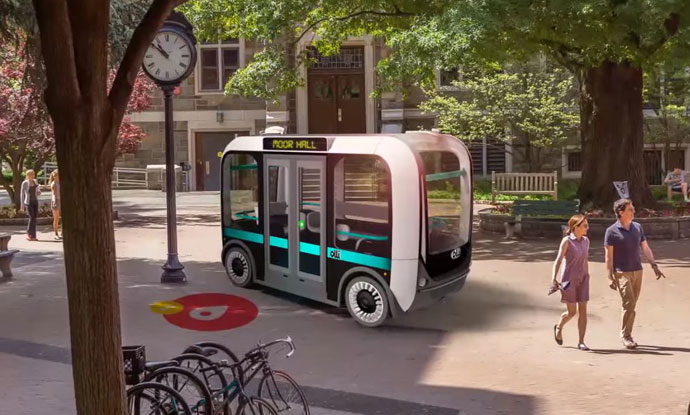
Cambridge looks set to become a test bed for driverless buses – otherwise known as autonomous mass-transit travel. The Affordable Very Rapid Transit (AVRT) would run overground on segregated routes and tunnelled sections .
Headed up by Professor John Miles, an expert on transport systems at the University of Cambridge, a feasibility study estimates the cost of a 75kms network would cost up to £800m.
According to the Greater Cambridge Partnership, “Other smart cities are interested in working together with Cambridge to build and demonstrate a prototype AVRT shuttle vehicle”.
A recent report by lobby group Greener Journeys highlights the difference in social-economic profile between bus users and rail passengers, drivers and cyclists – with a higher percentage of those on lower income travelling by bus. If this relegation of the bus to the role of safety net is to be addressed, perhaps lessons need to be learned from the competition. Uber and other tech-driven ‘on-demand’ services are revolutionising every area of life they target. In the face of uberHOP, an app-driven shared taxi service with reduced fares, 12-ton, 5 mpg double decker buses that drive the streets whether or not they have passengers on board or not seem old fashioned. It may be that for buses to survive, the transport mode needs to embrace new technology rather than view it as a threat.
There is much talk of driverless technology, but the vehicles it delivers may have more in common with what we currently think of as a bus.

Olli is a driverless bus concept that seats twelve passengers and can operate as a chartered shuttle, taxi or network of interconnected ‘pods’. Crucially, Olli has no need to drive the roads endlessly to ply its trade. Strictly speaking, it has no need for bus stops either although these would be a necessary means of summoning a vehicle for those without a smart phone.
It’s an application of existing technology that offers the best of two worlds, blending the logic of public transport with the freedom of private car ownership.
Your Journey Our world
The ETA was established in 1990 as an ethical provider of green, reliable travel services. Twenty seven years on, we continue to offer cycle insurance, travel insurance and breakdown cover while putting concern for the environment at the heart of all we do.
Donald Gilchrist
As a bus driver I cannot recognise a need for this kind off bus outside a city centre. The phrase ‘old fashioned’ shows to me that they are more interested in what it looks like than the reality of public transport, at a time when electric and hybride busses are avalable shows that these people are looking on busses as a problem not a solution. Stating that most people who use busses are poor means what? are they advecating a transport class devide or have they alloud there bus fleet to become old,decrepid,underfunded and out of touch with the needs of the people in there city. One last thing, when a tram was put along the same route as my bus, we lost people to it, ok its picking up now but mostly what happend was that public transport users moved from one form to another.
PS the only way to stop people driving into town is to demolish some car parks.